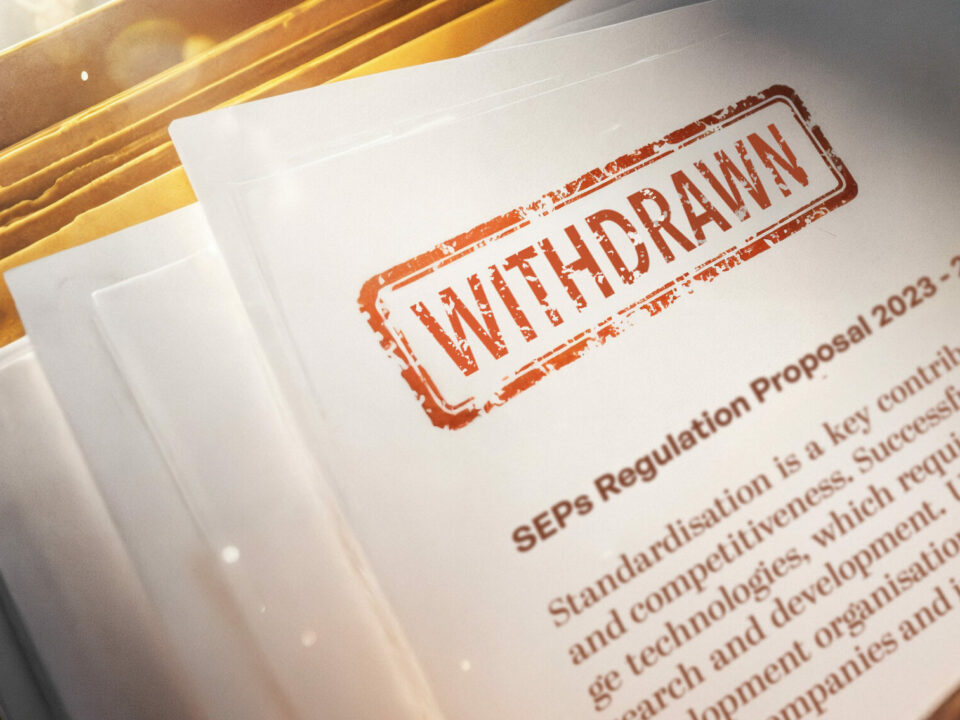‘License to all’ is a ‘license to kill’ innovation and jobs in Europe
European Commission’s Communication on Standard Essential Patents threatens European innovation industry and technological progress
[Monday, 6 November 2017: Brussels] IP Europe opposes the current draft of the Communication on Standard Essential Patents, that if adopted, will harm European inventors and threaten Europe’s position as a leader on the technology behind 5G and the Internet of Things.
The problem with the Communication proposal is the ‘License to all’ policy, a new, untested, licensing policy that would significantly harm the European innovation sector and could precipitate a decline in overall European R&D of 8% – leading to a reduction in GDP of 0.5% in the long term with an impact of €465 billion at 2016 rates.[i]
‘License to all’ is inefficient, it exponentially multiplies required licence negotiations and legal fees, delays and reduces access to the latest connectivity standards to consumers, and introduces questions about compatibility with the existing legal framework. Imposing this condition on one of Europe’s most innovative technology sectors would put at risk countless European jobs, and result in Europe relinquishing its leadership position on 5G and the Internet of Things before a single shot has been fired.
The success of the global smartphone industry and the daily use of over 5 billion mobile phones relies on the proven ‘access for all’ model that has been used for the past 20 years; it gives small and large European companies, Universities and Research Institutes the ability to collaborate and the scale to compete with the global technology giants. Simultaneously, it provides consumers and businesses with the best connectivity technology at competitive prices, supports tens of thousands of high tech jobs and has made Europe a leader in mobile telecoms.
The knock-on effects of a ‘License to All’ policy would mean delays and reduced access to the latest connectivity standards for European consumers, and could raise a number of high-stakes legal challenges. If adopted, this condition will harm one of Europe’s biggest technology sectors, endanger tens of thousands of high-paying European jobs, and stifle innovation by increasing the burden for innovators to receive proper payment for their development of key connectivity technologies.
According to Francisco Mingorance, Executive Secretary of IP Europe: “It seems extraordinary that the Commission would harm European innovators by imposing untested and damaging licensing requirements based on false assertions and partial information. If a company market abuse exists, European competition authorities already have the tools at their disposal to sanction the culprits and there is no need to propose untested policy changes that ultimately benefit non-European companies at the expense of Europe’s innovators.”
“This calamitous reframing of the longstanding and well-balanced licensing system would fatally undermine Europe’s successful system of open standards, remove all incentives to participate in their development, and in effect ‘throw under the bus’ all those European companies who invented cellular technologies in good faith. More than a lost opportunity to set out a clear European vision that promotes open standards, such a move is unthinkable. No communication would be a far better alternative.”
In 2015, similar changes to open standards policies were unilaterally imposed by some Silicon Valley giants on the US standards body responsible for the flagship Wi-Fi standard, the IEEE. The result has been that technology contributors, European and beyond, have refused to provide access to their technology under new terms[1] which impose artificially low royalties calculated on the value of computers chips, rather than the value-added conferred on an end product, and ban injunctions for unlicensed use.
In this environment, it is no surprise that some car makers, who are using European connectivity technologies but have not taken licenses for such use, have joined forces with the Silicon Valley giants seeking to impose artificially low royalties on European suppliers of connectivity technologies for autonomous vehicles. They prefer to side with the very Silicon Valley companies that could make them irrelevant tomorrow, in the hope of imposing lower prices for the supply of connectivity technologies today. They are also running the real risk that the technological improvements in connectivity that they require from European innovators to enable fully autonomous driving do not appear, or that such technological improvements become the property of the very same Silicon Valley companies.
Francisco Mingorance added that: “Under massive pressure from the Silicon Valley giants, the ‘license to all, or to any’ concept is actually a ‘license to kill’ innovation in Europe. If adopted, it will remove incentives for innovators to openly share cutting-edge technologies with the marketplace. Open standards will be replaced over time by proprietary connectivity technologies that are controlled by Silicon Valley giants at the expense of European consumers, competitiveness and job creation, with technology and jobs going to Asia and elsewhere.”
Under the tried and tested ‘access for all’ licensing system, app developers – another group being presented by their Silicon Valley sponsors as opponents to the status quo – do not pay a penny, and have never been asked to take a licence from the inventors of connectivity technologies as the equipment they use (Smartphones) is licensed. By contrast, an obligation to license to all or any actors in the value chain will expose these app companies to new financial demands, adding to the mandatory 30% tax on their sales revenue currently demanded by the monopoly owners of App platforms.
[1] Keith Mallinson, Development of innovative new standards jeopardised by IEEE patent policy, September 2017 [available here]
[i] IAN CORDEN, TIM MILLER, SARONGRAT WONGSAROJ, SAM WOOD, 2017: COMMERCIAL AND ECONOMIC IMPACTS FROM IPR POLICY CHANGES, concludes that: imposing the 2015 IEEE IP Rights policy changes on Europe – which is the objective of the FSA and its members – would be likely to precipitate a decline in overall European R&D of 8%, reducing European GDP by 0.5% in the long run. Such an impact would amount to €465bn (at 2016 rates).
-Ends-
About IP Europe
IP Europe brings together R&D intensive European companies and research institutes committed to innovation, from SMEs to global enterprises and non-profit research entities operating in a variety of industrial sectors. They all share a common goal: to maintain, at all policy levels, strong patent protection for innovators and support recognized fair, reasonable and non-discriminatory standardisation policies adopted by consensus that preserve fair compensation for innovators. IP Europe supports the use of Injunctive Relief against patent infringers and free riders that rely on R&D investments made by others to earn higher profits.
IP Europe was originally launched by Ericsson, Airbus and France Brevets. The Fraunhofer Institute participates in IP Europe in its capacity of academic advisor.
For more information, contact:
Laura Lichinski
laural@europa-insights.com
+32 493298882
Follow IP Europe on Twitter at:
@IPEuropeEU



